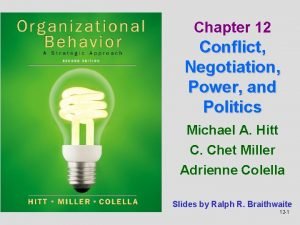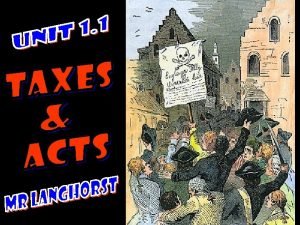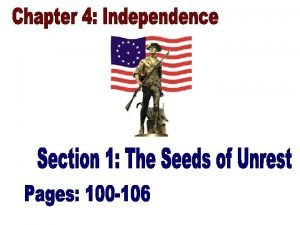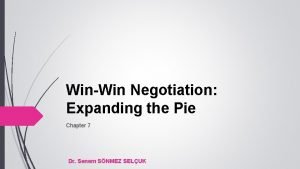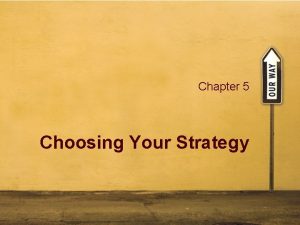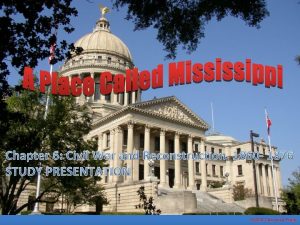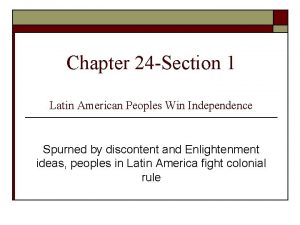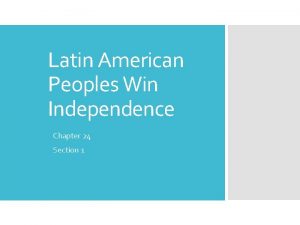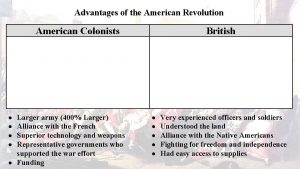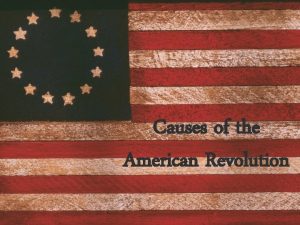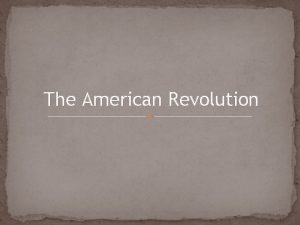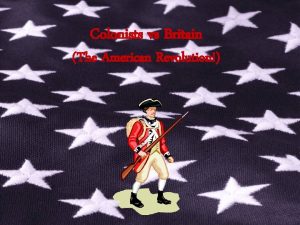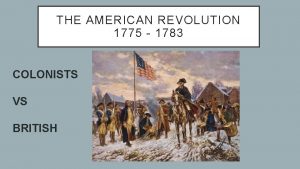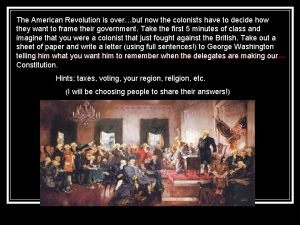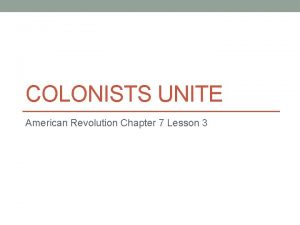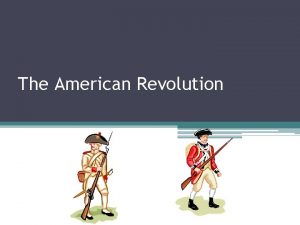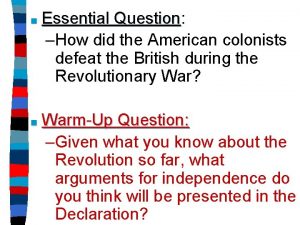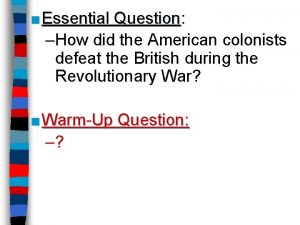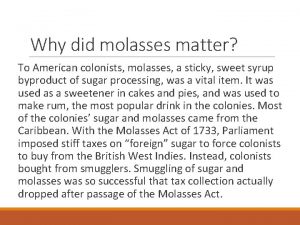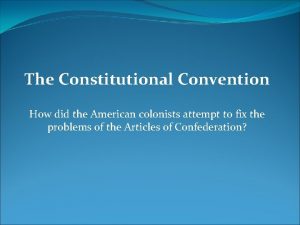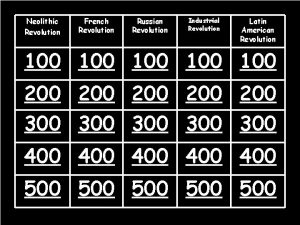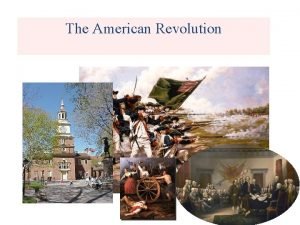The American Revolution How did the colonists win























- Slides: 23

The American Revolution How did the colonists win the American Revolution?

�Independence has been declared �Revolution fought from 1775 -1783 ◦ Revolution: overthrow of one government and its replacement with another ◦ Strategies-overall plans �Each side had its own strategy ◦ Each had strengths and weaknesses The American Revolution 13. 1 Introduction

�At the beginning ◦ No American army ◦ Just militias in each colony �Part time soldiers � 1775: George Washington army to lead a new ◦ Continental Army made of volunteers �A person who performs a service for free ◦ Enlisted for a year at a time �Agreed to serve in an army or a navy �Returned to care for family The American Revolution 13. 2 The Continental Army

� 8, 000 to 24, 000 were in the army at any given time ◦ Included African Americans and women �Problems with the ◦ Little money �Pay for soldiers �Buy supplies ◦ No training Continental Army The American Revolution 13. 2 The Continental Army

�Forming an Army ◦ Washington trained his men �Obey orders �Fight together �Encouraged them �Colonial Navy ◦ Small ◦ Trade and fishing ships ◦ Little cannons The American Revolution 13. 2 The Continental Army

�Over confident ◦ Planning to win from the beginning ◦ Strongest military in the world �Military: soldiers and armed forces ◦ Navy � 270 warships controlled the seas � 200 more built during the war ◦ Army �Paid soldiers (full-time job) ◦ Experienced fighters ◦ Very disciplined The American Revolution 13. 3 The British Army

�Perks of being British ◦ Parliament had money �Each soldier had a uniform, musket, short sword and bayonet � 48, 000 soldiers ◦ 30, 000 mercenaries �A soldier hired to fight for a foreign army ◦ Loyalists fought with British ◦ American Indians joined British �British had protected their land The American Revolution 13. 3 The British Army

�Strong but…. ◦ Far from home �Supplies, military orders, soldiers all had to travel ◦ Could take 3 months ◦ Get supplies ashore �Attacked by privateers ◦ Small, fast ships ◦ Given permission to attack by congress ◦ Kept the goods they captured ◦ French attacked when they joined the war The American Revolution 13. 4 The British Army Is Far From Home

� Continental Army has easy access to supplies ◦ Stole from British ◦ Local citizens would supply food � Women played a role ◦ Supported continental army �Took care of farms and businesses while men were fighting �Brought supplies to camp �Made uniforms �spied � British had no support ◦ Surrounded by people who hated them ◦ Lost motivation The American Revolution 13. 4 The British Army Is Far From Home

� Continental Advantage ◦ Stronger motivation/desire to win �Defending individual rights �Fighting for a better future �Goals worth dying for � Valley Forge, PA ◦ Cold winter of 1777 -1778 ◦ Washington’s troops were starving and freezing ◦ 2, 500 + men died ◦ DID NOT GIVE UP � British ◦ Fought because it was their job ◦ Parliament also worried about protecting its colonies from France and Spain ◦ Many did not want to pay for the war The American Revolution 13. 5 The Continental Army Is Motivated to Win

�British Negativity ◦ Fought because it was their job ◦ Parliament also worried about protecting its colonies from France and Spain ◦ Many did not want to pay for the war �Support for the British ◦ Loyalists ◦ Slaves ◦ American Indians The American Revolution 13. 5 The Continental Army Is Motivated to Win

�Different Strategies (played to strengths) ◦ British �Took the offense �Attack and control ◦ Continental �Took the defense �Protect themselves instead of destroy �British wanted a quick win ◦ Took control of Boston �Supposed “headquarters” �Independence fought for in all colonies The American Revolution 13. 6 Different War Strategies

�August 1776 ◦ Battle of Long Island gave the British control of NYC ◦ Washington moved to the countryside �Used new tactics (a planned action, such as a way of moving or using troops, aimed at reaching a certain goal) ◦ Quick attacks, quick retreats left British puzzled ◦ British tried to openly engage American troops �Washington sneaked away in the middle of the night ◦ Crossed the Delaware and attacked German Mercenaries at Trenton who were celebrating Christmas (Key Victory!) The American Revolution 13. 6 Different War Strategies

� 1777 British determined to force Washington into a face to face battle ◦ Took control of Philadelphia ◦ Washington, to protect his men, gave up Philadelphia �Moved to Valley Forge to train ◦ Good position to defend and protect Congress The American Revolution 13. 6 Different War Strategies

�Allies were needed for the Patriots to win the war ◦ 1776 Ben was sent to France �Got arms and monetary loans �Lafeyette and von Steuben The American Revolution 13. 7 The Continental Army Gains Allies

� The Turning Point of the War ◦ An event that leads to a dramatic change � Saratoga 1777 ◦ 9, 000 British from Canada, stopped by 2, 000 Vermont and New Hampshire soldiers ◦ Left Burgoyne stranded at Saratoga �Surrendered to General Gates � Led to support from the French ◦ Spain supported the French ◦ Dutch joined in with money � Britain focused on the south with strong support from loyalists ◦ Fell is 1781 when Spain took Pensacola The American Revolution 13. 7 The Continental Army Gains Allies

�Britain attacked Virginia ◦ Cut off by the French ◦ Attacked for 2 weeks at Yorktown �Cornwallis surrendered �Battle battle of Yorktown was the last major The American Revolution 13. 7 The Continental Army Gains Allies

�British were ready to end ◦ All countries met in Paris the war �Fighting continued ◦ On the seas and on land ◦ British still controlled major cities �Treaty of Paris 1783 ◦ Great Britain recognized the USA as independent ◦ Gave the USA lots of land ◦ British kept Canada ◦ Spain took Florida The American Revolution 13. 8 The Treaty of Paris 1783

�United States promised to restore ◦ Did not follow through often ◦ Loyalist and African Americans fled �Patriots won! �Forever know as Americans The American Revolution 13. 8 The Treaty of Paris 1783 loyalists

�Rachel Well’s story �Soldier’s raided towns ◦ Stole money, food, clothing, firewood ◦ Burned homes �Short supplies and high prices �Malnutrition led to disease The American Revolution Reading Further: The War

�Women ◦ Spied ◦ War nurses �Greater risk of dying than soldiers ◦ fundraisers ◦ Writers gained support �Mercy Otis Warren �Katherine Goddard ◦ Some fought in battles �Anna Lane �Deborah Sampson �Mary Ludwig Hays Mc. Cauley (Molly Pitcher) The American Revolution Reading Further: The War

�African Americans ◦ 1776 500, 000 slaves �Many took Great Britain’s offer of freedom ◦ British would turn away slaves �Some starved �Caught and returned ◦ Some fought for Patriots �Initially colonists did not want to arm slaves ◦ Eventually faded �Pretended to serve one side (spy for the other) The American Revolution Reading Further: The War

�American Indians ◦ Saw both sides as threats ◦ Both sides wanted American Indian support �Some chose sides ◦ Many stayed out of it �Hoping the two would wear each other out ◦ Difficult to stay neutral �Got caught in fighting �Couldn’t be trusted �Punished harshly for helping the other �Raided for supplies �Patriot victory led to westward movement The American Revolution Reading Further: The War
 Habit 4 think win win summary
Habit 4 think win win summary Win win win lose lose lose
Win win win lose lose lose Win win situacija
Win win situacija How could the french revolution been avoided
How could the french revolution been avoided Why did the colonists hate the townshend acts
Why did the colonists hate the townshend acts Why did the colonists resent the stamp act?
Why did the colonists resent the stamp act? Expand the pie
Expand the pie Habit 4 examples
Habit 4 examples Habit 4: think win-win examples
Habit 4: think win-win examples Habit 4 think win win
Habit 4 think win win Example of a lose lose situation
Example of a lose lose situation Win win strategies
Win win strategies Habit 4 think win win summary
Habit 4 think win win summary Win win nacin placanja
Win win nacin placanja Habit 4 think win win summary
Habit 4 think win win summary What tactics were used to win the “revolution of 1875”?
What tactics were used to win the “revolution of 1875”? Latin american people win independence
Latin american people win independence Latin american social classes
Latin american social classes Latin american peoples win independence
Latin american peoples win independence Latin american peoples win independence
Latin american peoples win independence Latin american peoples win independence
Latin american peoples win independence Latin american peoples win independence
Latin american peoples win independence Russian revolution vs french revolution
Russian revolution vs french revolution Green revolution vs third agricultural revolution
Green revolution vs third agricultural revolution

